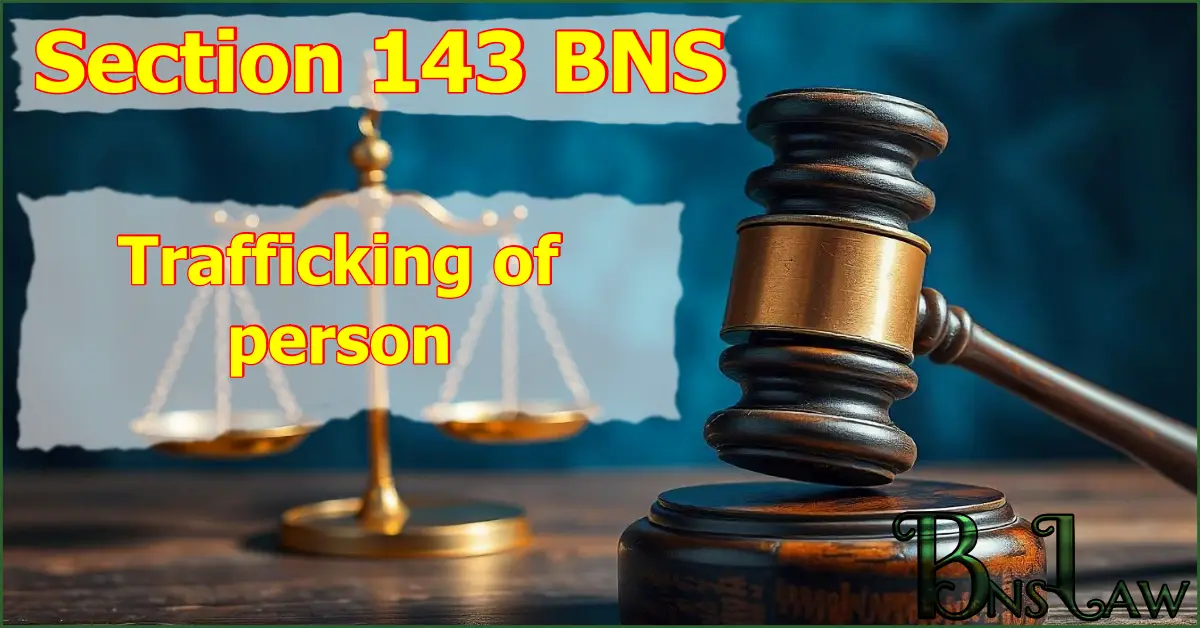Section 143 BNS | BNS 143
143(1) BNS
Whoever, for the purpose of exploitation recruits, transports, harbours, transfers, or receives a person or persons, by—
(a) using threats; or
(b) using force, or any other form of coercion; or
(c) by abduction; or
(d) by practising fraud, or deception; or
(e) by abuse of power; or 57
(f) by inducement, including the giving or receiving of payments or benefits, in order to achieve the consent of any person having control over the person recruited, transported, harboured, transferred or received, commits the offence of trafficking.
Explanation 1— The expression “exploitation” shall include any act of physical exploitation or any form of sexual exploitation, slavery or practices similar to slavery, servitude, beggary or forced removal of organs.
Explanation 2— The consent of the victim is immaterial in determination of the offence of trafficking.
143(2) BNS
Whoever commits the offence of trafficking shall be punished with rigorous imprisonment for a term which shall not be less than seven years, but which may extend to ten years, and shall also be liable to fine.
143(3) BNS
Where the offence involves the trafficking of more than one person, it shall be punishable with rigorous imprisonment for a term which shall not be less than ten years but which may extend to imprisonment for life, and shall also be liable to fine.
143(4) BNS
Where the offence involves the trafficking of a child, it shall be punishable with rigorous imprisonment for a term which shall not be less than ten years, but which may extend to imprisonment for life, and shall also be liable to fine.
143(5) BNS
Where the offence involves the trafficking of more than one child, it shall be punishable with rigorous imprisonment for a term which shall not be less than fourteen years, but which may extend to imprisonment for life, and shall also be liable to fine.
143(6) BNS
If a person is convicted of the offence of trafficking of a child on more than one occasion, then such person shall be punished with imprisonment for life, which shall mean imprisonment for the remainder of that person’s natural life, and shall also be liable to fine.
143(7) BNS
When a public servant or a police officer is involved in the trafficking of any person then, such public servant or police officer shall be punished with imprisonment for life, which shall mean imprisonment for the remainder of that person’s natural life, and shall also be liable to fine.
READ OTHER SECTIONS OF CHAPTER VI — OF OFFENCES AFFECTING THE HUMAN BODY
FAQs of BNS Section 143
-
143 BNS punishment and fine
Punishment and fine under Section 143 of the BNS—
BNS 143(2): Rigorous imprisonment for not less than 7 years but which may extend to 10 years and fine.
BNS 143(3): Rigorous imprisonment for not less than 10 years but which may extend to imprisonment for life and fine.
BNS 143(4): Rigorous imprisonment for not less than 10 years but which may extend to imprisonment for life and fine.
BNS 143(5): Rigorous imprisonment for not less than 14 years but which may extend to imprisonment for life and fine.
BNS 143(6): Imprisonment for life which shall mean the remainder of that person’s natural life and fine.
BNS 143(7): Imprisonment for life which shall mean the remainder of that person’s natural life and fine. -
143 BNS cognizable or not
Offences under all sub-sections of Section 143 are cognizable.
-
143 BNS bailable or not
Offences under all sub-sections of Section 143 are non-bailable.
-
143 BNS trial court
Offence specified under all sub-sections of Section 143 are triable by the Court of Session.
Important Points
- Cognizable Offences: These are offences where a police officer can arrest a person without a warrant.
- Non-Cognizable Offences: These are offences where a police officer cannot arrest a person without a warrant.
- Bailable Offences: These are offences where the accused can get bail from the police station itself. All bailable offences are listed in the First Schedule of the Bharatiya Nagarik Suraksha Sanhita (BNSS).
- Non-Bailable Offences: Offences in which bail is not granted directly from the police station but after hearing the case in the court, the judge decides when bail will be granted. All non-bailable offences are listed in the first schedule of the Bharatiya Nagarik Suraksha Sanhita (BNSS).
- In the above FAQ, “trial court” means the court that has jurisdiction to try the offence.
- In the above FAQ, the expression “Magistrate of the first class” and “Any Magistrate” does not include Executive Magistrates.
Read other Sections of the BNS
Reference Link: New Criminal Laws (BNS), Ministry of Home Affairs







